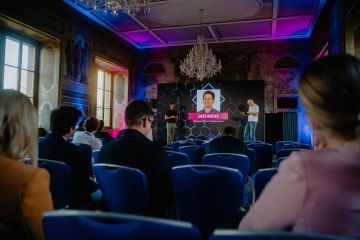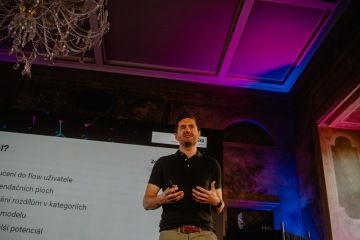By how much percent can AI increase e-shop sales?
3 years ago
Interview with FastAI team leader Lukáš Matějka about individual content for each user and the fear of artificial intelligence.

You recently spoke about using AI in business at the International E-commerce Summit. What caught your attention the most?
If I were to summarise, I have heard enough concrete evidence that the competitive pressure in online sales is increasing and will continue to do so. Only those who offer the best service will survive. I will make two arguments:
1) The highly saturated e-commerce market in the country is starting to consolidate. The number of players in the market will inevitably decrease. At the same time, new players are about to enter the market. In this respect, the entry of Kaufland, which is about to come to the Czech Republic with a new marketplace, was interesting.
2) People who have de facto built the Czech e-commerce environment point out why it is getting harder and harder to get into the black. E-commerce tools have become "commoditized". Having your own e-shop is now effortless, thanks to the available platforms. This also means that margins are down and more often than not, price is a struggle. If an e-shop doesn't have its own unique product or exceptional service, personalisation... in short, something that sets it apart, it is challenging to make a name for itself.
When we talk about current trends, what role does data or artificial intelligence play?
Today, you basically have no choice but to use data to make decisions. Firstly, so that you don't "miss the train" as they say, and secondly, because data gives you a decent opportunity to differentiate yourself. They can provide insights that result in a competitive advantage. But it would help if you were dedicated to it, know how to collect it effectively, analyse it and, most importantly, interpret it. A colleague from Keboola had some interesting insights on what analyses are not usually done in e-commerce: for example, order predictions, which can significantly impact inventory and thus costs, or RFM analysis, which does basic user segmentation.
What about AI? Does it have results, or is it still just a buzzword?
I'll speak for my team. We are developing a product called Zoe.ai - Deep recommendation. It can track user behavior on the web and evaluate the behavior in real-time using machine learning algorithms. It can provide very high-quality personalization and product recommendation. At the summit, I gave an example of our project for Heureka. On a test sample defined by Heureka, we increased their sales by more than 5% by giving each user tailored recommendations based on their online behaviour. That's a decent result, I'd say.

What exactly does Zoe.ai bring to the business?
Zoe.ai is helpful for scenarios where I need to give a real-time answer in an online environment, typically to personalize the content offered. To give you an idea; there may be signals that a user wants to leave. Zoe.ai can show him an individual incentive that matches his historical, but more importantly, current behavior. Our current focus is on e-commerce, but it works elsewhere too.
How does it work?
We build on structured data. Real-time online behaviour enters the model, i.e. what the user is looking at, where they are clicking, how long they have been there, whether they have looked at reviews or elsewhere, whether they have filled something out online, whether they have gone back and corrected it... in short, everything you can imagine. We add details about the device, which we enrich with data from third parties (current price, age, etc.).
Zoe.ai is unique in that it can take into account not only my past behaviour, but also what I am doing as a user right now, which is usually even more relevant. And it can react to that immediately. Real-time automation of actions is the latest trend in recommendation.
Can Zoe make a recommendation that one is really happy with in the end?
Good question. The answer is yes, Zoe.ai is very good at recommending. Of course, it has some assumptions and limitations. The limitation is the amount of data about user behavior. If there is enough, the recommendation is good. One such trump card in this regard is the advances in deep learning, which are helping us outperform traditional methods. In addition, input data and computing power are also constantly improving. So I dare say it will be even better in the future.
And will it always work? Or, how difficult is it to try out such a tool?
It is easy for the e-shop. A basic A/B test can be tested very quickly without complex integration. It is computationally demanding for Zoe.ai, but that is our concern. It's extremely useful for large e-shops and marketplaces, but for anyone with many users and products or a specific buying process (conversion). The more information about user behavior, the faster Zoe learns.

How do you perceive the current situation on the Czech market? Do you have competition?
Personalisation is currently a strategic topic and is addressed by a number of tools. However, Zoe.ai has a distinct competitive advantage in that it works with real-time scenarios and has its own neural network-based "AI engine" that is very fast and can be easily configured to suit the needs of a particular customer, a chosen scenario, or perhaps a specific form of customer journey, and so on; if it makes business sense, which it often does.
Will a tool like Zoe be used by every e-shop one day? Or is it also about the approach and parameters of the e-shop?
Yes, I believe that something like this will be a standard that every e-shop will use one day. In their basic version, such tools will eventually be part of platforms offering comprehensive services to e-shops. On the other hand, there will probably always be, at the same time "heavier calibers" that can do more and will be designed for the specific needs of the biggest e-shops and e-commerce platforms. And that's where the business will be interesting. BCG consultants predict that online content personalization will cause e-commerce turnover to shift prospectively to the 15% or so of companies that do it well.
What gave you the idea to create Zoe.ai? What was the trigger?
I've seen very few people tackle real-time scenarios. One example for all of them: one time I left a gas station and while I was at home, I got a text that they were having a sale on something. I realized the hole in the market. The ability to react to momentary user behaviour in real time is first and foremost offered in an online environment. That's why Lundegaard and I came to an agreement and I started working on automating decisions and triggering actions that react to user behaviour on the web.

How did you get into AI and what you're creating today? What is the story of Lukáš Matějka in a nutshell?
I guess it started in high school; I always wondered how to make an algorithm that would play games with an opponent. When I studied neural networks and "data mining" (sort of a precursor to artificial intelligence) at university, I had high hopes for it. But at the time, I was disappointed. Neural networks were still weak then and practical applications were far away. The fodder for AI is data, and it was waiting for that. So was computing power. Today we are further along, plenty of data is available and we can work with it effectively too.
This has allowed me to create an autonomous team within Lundegaard and focus on development to find business applications for AI. We are intensively looking for "use cases" in different industries where we can add the most value. This has been my daily bread for the last 5 years or so.
What do you enjoy most about it?
I enjoy working with smart people and I enjoy solving complex problems. I see a future in AI and data, despite the hype around it today. Outside of our domain, I've recently become very interested in GANs (Generative Adversarial Network, simply put, a method that generates very realistic content using two neural networks that compete and interact with each other to produce the best outcome; editor's note). This stuff is currently changing the world. Take the example of creating photos or videos: one network generates images and the other part opposes it and says if they are "natural" enough.
How is AI better than a human?
I enjoy working with smart people, and I enjoy solving complex problems. Despite the hype around it today, I see a future in AI and data. Outside of our domain, I've recently become very interested in GANs (Generative Adversarial Network, put, a method that generates very realistic content using two neural networks that compete and interact with each other to produce the best outcome; editor's note). This stuff is currently changing the world. Take the example of creating photos or videos: one network generates images and the other part opposes them and asks if they are "natural" enough.
It is still true that it is still a long way from the so-called generic artificial intelligence, which resembles the human one and can solve unknown and unstructured problems.
And what if the AI tools work really well; wouldn't that be cause for concern? Do you expect any mental resistance from the user?
If I have confidence as a user that my data is safe, not being misused, and that I can choose what I provide and what I no longer provide, then I will gladly trade my data for a better service. Unfortunately, it is true that today we are seeing rather the opposite development. The biggest companies treat our data as a commodity that is a source of profit for them and nothing more. Data is treated purely as a 'market'. The solution could be thoughtful regulation, which we must work towards. That is the fundamental prerequisite for this to work.
What about AI in the future? Should we be afraid?
I am convinced that the potential of AI is huge and will have a transformative impact on the economy. It is already evident that it will take the bulk of the work that people in many professions do today, from doctors and lawyers to warehouse workers.
From my position, I see the business use case in personalising the user interface. So far, it's proving to be quite complex and it's not a priority topic for business at the moment, but the potential is huge and I think we're yet to see it.
But at the same time, AI is now a buzzword and is often seen as a kind of "silver bullet" or solution to everything. This is far from true. We're still talking about particular tasks that require the kind of detailed analysis and tasking that only humans are capable of and probably will be for a long time to come.

Lukáš Matějka
Lukáš has more than 20 years of experience in technical and management positions. He programmed one of the first "big-data" web archiving applications in the Czech Republic, implemented large-scale applications for IBM, was responsible for delivering web applications and portals for large companies and led developers at Avast. In the last 5 years he has been working on artificial intelligence and Fast Data technologies. With his team, he develops Zoe.ai, a tool that processes and interprets data from online behaviour in real time and, for example, recommends tailored content to specific users.